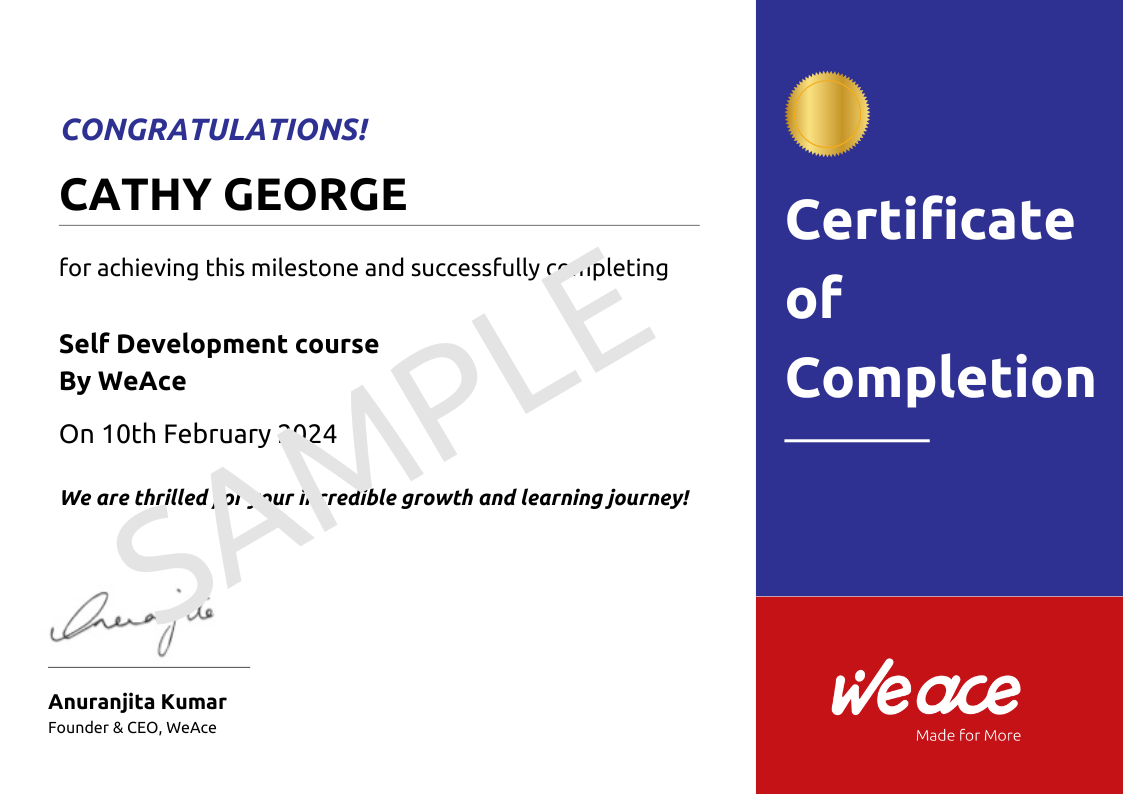Course Details
This is a half-day program for a batch size of 30 professionals.
A strategic thinking can be highly beneficial for personal and professional growth. Here’s a detailed look at why you should consider attending such a session and what you can expect to gain from it:
1. Understanding Strategic Thinking
- Definition and Importance: Learn what strategic thinking is and why it is crucial for long-term success in various contexts.
- Strategic vs. Tactical Thinking: Understand the difference between strategic thinking (long-term, big picture) and tactical thinking (short-term, immediate actions).
2. Developing Vision and Goals
- Vision Development: Learn how to develop a clear and compelling vision for your organization or personal career.
- Goal Setting: Understand how to set strategic goals that align with your vision and provide direction.
3. Analyzing the Environment
- SWOT Analysis: Gain skills in conducting SWOT (Strengths, Weaknesses, Opportunities, Threats) analysis to understand internal and external factors.
- PESTLE Analysis: Learn how to use PESTLE (Political, Economic, Social, Technological, Legal, Environmental) analysis to assess the broader environment.
4. Enhancing Decision-Making Skills
- Critical Thinking: Develop critical thinking skills to analyze information and make well-informed decisions.
- Decision-Making Frameworks: Learn frameworks and tools for making strategic decisions, such as the Decision Matrix and the 5 Whys.
5. Fostering Innovation and Creativity
- Creative Problem-Solving: Explore techniques for fostering innovation and creativity in strategic thinking.
- Innovative Strategies: Understand how to develop and implement innovative strategies that give a competitive edge.
6. Long-Term Planning
- Strategic Planning Process: Learn the steps involved in the strategic planning process, from initial analysis to implementation and evaluation.
- Scenario Planning: Gain skills in scenario planning to anticipate future challenges and opportunities.
7. Aligning Resources and Capabilities
- Resource Allocation: Understand how to allocate resources effectively to support strategic goals.
- Capability Development: Learn how to develop and leverage organizational capabilities to achieve strategic objectives.
8. Building Strategic Relationships
- Networking and Partnerships: Discover the importance of building strategic relationships and partnerships to enhance strategic initiatives.
- Stakeholder Engagement: Learn techniques for engaging and managing stakeholders to gain support for strategic plans.
9. Implementing and Monitoring Strategies
- Execution Frameworks: Understand frameworks for executing strategic plans, such as Balanced Scorecards and OKRs (Objectives and Key Results).
- Monitoring and Evaluation: Learn how to monitor progress and evaluate the effectiveness of strategic initiatives.
10. Adapting to Change
- Change Management: Develop skills in change management to adapt strategies in response to evolving circumstances.
- Agility and Resilience: Learn how to build organizational agility and resilience to thrive in a dynamic environment.
11. Personal Development
- Strategic Mindset: Cultivate a strategic mindset that focuses on long-term vision and proactive planning.
- Continuous Learning: Embrace continuous learning and improvement to stay ahead in strategic thinking.
For more information on pricing and registration, contact [email protected]
Program Structure
1. Introduction and Orientation
- Welcome and Icebreaker Activities: Engage participants with activities to build rapport and create a comfortable learning environment.
- Program Overview: Introduction to the session’s goals, agenda, and expected outcomes.
- Setting Ground Rules: Establish guidelines for respectful communication and active participation.
2. Understanding Strategic Thinking
- Definition and Importance: Explain what strategic thinking is and why it is essential for long-term success.
- Strategic vs. Tactical Thinking: Discuss the differences between strategic thinking (long-term, big picture) and tactical thinking (short-term, immediate actions).
3. Developing Vision and Goals
- Vision Development: Teach participants how to develop a clear and compelling vision for their organization or personal career.
- Goal Setting: Explain how to set strategic goals that align with the vision and provide direction.
4. Environmental Analysis
- SWOT Analysis: Introduce SWOT (Strengths, Weaknesses, Opportunities, Threats) analysis for understanding internal and external factors.
- PESTLE Analysis: Teach participants how to use PESTLE (Political, Economic, Social, Technological, Legal, Environmental) analysis to assess the broader environment.
5. Critical Thinking and Decision-Making
- Critical Thinking Skills: Develop critical thinking skills to analyze information and make well-informed decisions.
- Decision-Making Frameworks: Introduce frameworks and tools for making strategic decisions, such as the Decision Matrix and the 5 Whys.
6. Innovation and Creativity in Strategy
- Creative Problem-Solving: Explore techniques for fostering innovation and creativity in strategic thinking.
- Developing Innovative Strategies: Teach how to develop and implement innovative strategies that provide a competitive edge.
7. Long-Term Planning and Scenario Planning
- Strategic Planning Process: Guide participants through the steps involved in the strategic planning process, from initial analysis to implementation and evaluation.
- Scenario Planning: Train participants in scenario planning to anticipate future challenges and opportunities.
8. Resource Allocation and Capability Development
- Effective Resource Allocation: Teach how to allocate resources effectively to support strategic goals.
- Developing Organizational Capabilities: Discuss how to develop and leverage organizational capabilities to achieve strategic objectives.
9. Building and Sustaining Strategic Relationships
- Networking and Partnerships: Highlight the importance of building strategic relationships and partnerships to enhance strategic initiatives.
- Stakeholder Engagement: Teach techniques for engaging and managing stakeholders to gain support for strategic plans.
10. Implementing and Monitoring Strategies
- Execution Frameworks: Introduce frameworks for executing strategic plans, such as Balanced Scorecards and OKRs (Objectives and Key Results).
- Monitoring and Evaluation: Discuss how to monitor progress and evaluate the effectiveness of strategic initiatives.
11. Adapting to Change
- Change Management: Develop skills in change management to adapt strategies in response to evolving circumstances.
- Building Agility and Resilience: Teach how to build organizational agility and resilience to thrive in a dynamic environment.
12. Personal Development
- Cultivating a Strategic Mindset: Encourage participants to cultivate a strategic mindset that focuses on long-term vision and proactive planning.
- Continuous Learning: Emphasize the importance of continuous learning and improvement to stay ahead in strategic thinking.
13. Action Planning and Follow-Up
- Personal Action Plan: Guide participants in creating a personal action plan to apply what they’ve learned in their own roles.
- Follow-Up Activities: Provide suggestions for ongoing practice and development, such as reading materials, online courses, and peer support groups.
14. Evaluation and Feedback
- Participant Feedback: Collect feedback from participants to assess the effectiveness of the session and identify areas for improvement.
- Program Evaluation: Review the outcomes and impact of the program to ensure continuous improvement.
Additional Elements
- Guest Speakers: Invite experts in strategic thinking to share their insights and experiences.
- Resource Materials: Provide participants with handouts, books, and online resources for further learning.
- Certification: Offer a certificate of completion to participants who successfully complete the program.
Get your certificate of completion

-
DURATION 3 Hour(s)
-
LEVEL Entry Level (0-2 years), Junior Level (2-7 years), Mid Level (8-15 years), Senior Level (15+ years)
-
FORMAT Online Instructor Led
-
CERTIFICATION Yes
-
Academy Leadership & Management
-
Topics Strategic thinking
-
KEY LEARNING AREA Upskilling, Sustainability, Growth Mindset
-
SKILLS Growth Mindset, Strategy
-
BEST FOR Working Professionals
-
TRAINER WeAce

/filters:strip_exif()/wocademy/images/logo/BD8xUZSfYIhJrdZOkNLxyavZqrtvLZEhVNUSjNJu.jpg)
 Led
By: WeAce
Led
By: WeAce
 Online
Instructor
Led
Online
Instructor
Led
/filters:strip_exif()/wocademy/images/logo/oqA2k7nGNGgXUCiw56oZxYobDIEaWlHUVtlx88zQ.png)
/filters:strip_exif()/wocademy/images/logo/UsyNyAwCAyUHK8SblsVPzTf10sTvj5D6Ekfk5vvf.jpg)
/filters:strip_exif()/wocademy/images/logo/unI7jt2VBQZwes7NDTSvaPS0SKvlVH5TOmvI0bEA.jpg)
/filters:strip_exif()/wocademy/images/logo/PMYixMT7x7xt9ER9Pe2YF7HANw1e1NrdMYym6DzB.jpg)
/filters:strip_exif()/wocademy/images/logo/JHuFUEbQa3FC6BfrNu0sCaGjiEhuz2kZIo14zJWd.jpg)
/filters:strip_exif()/wocademy/images/logo/UhXaCizL0PYpLVMiqSH0nUrriYDT1jpcMZFfR7vs.jpg)
/filters:strip_exif()/wocademy/images/logo/TsTw1PhMdrqwuV4QcOOVu5L2EMwQnypqwYcrfv4E.jpg)